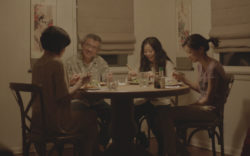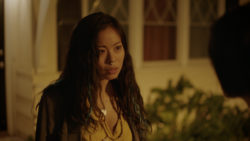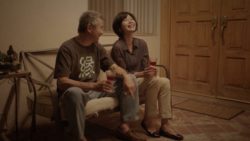In director Alex Chu’s second feature FOR IZZY, he assembles a motley crew of characters who find an unlikely kinship with each other when they become next door neighbors. Dede (played by Walking Dead actress Michelle Ang), a recovering addict and photojournalist, and her burnt out mother, Anna, meet Laura, a high-functioning autistic yearning for independence, and Peter, her overprotective father. Laura becomes the key to Dede’s sobriety and Dede becomes Laura’s window to the outside world, all while Anna and Peter enter into an unexpected romance. Told in the format of a confessional documentary and incorporating sequences of found footage and animation, FOR IZZY is a charming and poignant look at recovery and the ways we hold for each other.
CineVue got to chat with director Alex Chu and co-producers/ actresses Michelle Ang and Jenny Soo about how they nabbed footage for the film, how they molded a script to reflect so many marginalized identities, and what they would tell a documentary camera if they were facing one.
AAIFF41 is screening FOR IZZY on Friday, 8/3. For tickets and more info, visit our website.

The form of FOR IZZY is so interesting. Why film it as a documentary and incorporate animation?
Alex Chu: The elements of this story were answers to a series of questions we asked at the very beginning, before the script was even written, but I had an idea of the story and characters. For example, what if we wanted part of the story to take place in Hong Kong, but didn’t want to go there or couldn’t afford to go there? The character of Laura loved to draw, so the idea of animation as an important thread through the film came up. Same with the documentary aspect. What if we couldn’t or didn’t want to shoot everything conventionally? The character of Dede was a photojournalist, so the idea of incorporating that into the storytelling came from there. Ultimately, it was trying to find a sense of freedom and fun when you had no money to shoot. What if we could mix consumer camera footage with a traditional cinema camera? Why write a film in a conventional way if no one is telling us to?
Michelle Ang: This was one of the elements that drew me into the project from the start. The animation wasn’t in the early drafts, but the interplay between documentary and narrative was an intriguing structure. It allowed the inner thoughts of the characters to be shared as the story progressed. It felt candid and fresh.
FOR IZZY is a film that explores so many different identities, from a lesbian lead to a character with high-functioning autism to a romance between two people of an older generation (people who look like our parents’ age!). Was it difficult to represent these characters? How did their identities transform the script?
Alex: The characters were there in many ways before a story was in place. I have virtual binders full of character sketches and/or character relationships, as well as fragments of scenes and concepts looking for a story. These are typically taken from people I know in my life, or composites of people I know, with some creative license thrown in. And the four characters in FOR IZZY were no different in that respect. So the identities of these characters didn’t transform the script as much as they were the foundations of the script, and the characters tell the story. Also, during the writing process, I workshopped it with Michelle, Jenny, Elizabeth and Jim at my place, where we read the script and they’d give me feedback. Getting input from others is important to me, especially from actors/creators whom I admire and respect, like the four actors in our film. The script went through about ten drafts before shooting.
FOR IZZY brings together a lot of topics that seem taboo in Asian households, including addiction, disability, and queerness. I’m thinking about my own family and how admitting to some of these things, like queerness or mental health, would be understood as a kind of “failing.” One of the most heartening scenes for me was seeing every single one of them sitting at the dinner table together, laughing and eating. To see these fractured characters/ families make some sense of wholeness for each other and to be at peace, momentarily, with the people we are was so hopeful. Did the thought of “failure” ever cross your minds in the whole process? Do you think FOR IZZY redefines the concept of failure for Asian Americans?
Michelle: I loved the fact that Dede’s sexuality is never leaned into. It’s just a color in the tapestry of her life. That was refreshing and important to me. I also echo your sentiment about it feeling taboo to have queerness be accepted in Asian households. I think it’s therefore interesting that Dede’s mother, Anna, is shown in this story to not be judgmental of that all. Instead it’s her daughter’s addiction which troubles her.
And along with that, what were some of your favorite or most memorable scenes to shoot or perform?
Jenny Soo: The road trip to San Francisco was really special. It was our last week of production, and we were all bone-tired, but that trip reinvigorated us. It’s just such a beautiful city. Jim lived there in the past, so it was wonderful seeing him reconnect to some of his roots. That part of the film was less scripted, so it was also really fun to improv and develop the characters even more, as well as play with how they responded to being in a different environment.
Michelle: Yeah, the roadtrip to San Francisco was fun. As a splinter crew, we took two cars and actually shot the road trip. Then we went rogue on the city, gathering stolen footage on the streets and stoops. We had an issue with location which needed some last minute producer wrangling, but it added to the excitement in ways.
 Michelle, what drew you to work on FOR IZZY? You have an extensive acting career; what was it like to work as a producer this time?
Michelle, what drew you to work on FOR IZZY? You have an extensive acting career; what was it like to work as a producer this time?
Michelle: From the moment I read the script, it really ignited my imagination. It was such a fresh take on telling a family story. And as a seasoned actress in “Hollywood,” I knew the chance for me to play such a complex, troubled character like Dede would hardly ever come about. Part of this is still the stereotyping that Asian women face. We are seldom seen as “messy” or addicts, but Dede is loud, unapologetic, and in many ways, selfish. I loved getting the chance to play someone almost unlikeable and having to find a way to make her endearing to audiences.
I asked Alex if he would consider me joining the producing team and was delighted when he said yes. I have experience producing in commercials and had reached a point where I was interested in championing projects and stories that would add what was lacking in mainstream opportunities. I wanted to make sure Alex had the opportunity to reach the best resources to achieve his vision for this worthy script.
Jenny, what drew you to work on FOR IZZY? Was it difficult for you to play the role of Laura?
Jenny: I met Alex on his first feature YES, AND… and we really hit it off. When he was in the beginning stages of brainstorming the film, he told me he had written a role for me and brought me on fairly early as both an actor and producer. As an actor, it’s a joy to be given the opportunity to play a role that requires research and asks you to search deeper within yourself in the way that Laura did. However, I was definitely really nervous. I wanted to make sure that the portrayal was three-dimensional, truthful, and served the story. Luckily, some wonderful people at Exceptional Minds, F.A.C.T, and The Miracle Project, as well as a few young women on the spectrum, were incredibly generous and took the time to meet and speak with me. I also have to give Alex a lot of credit. He’s an incredible collaborator. If I came back after some research and character development and had some questions or issues with the character, he was always willing to hear me out and work my thoughts into the script.
Alex, I read that you sold your car to help fund production. It’s a testament to your commitment to telling stories that don’t traditionally get funded or make it to the mainstream. Why are telling these stories important for y’all?
Alex: For me, it’s just doing what you have to do to get something made. I’ve been a musician my entire life, and I love the punk rock DIY mentality from the 70s and early 80s (Ramones, Dead Kennedys, X), and I try to approach filmmaking that way. Pick up a camera and shoot. Be aware of tradition and convention, but don’t be bound by it. And hopefully by example, inspire others to do it their way too. For me at least, it’s more of a compulsion to tell stories than it is anything else. And as long as the compulsion is there, I’ll find an outlet for it.
Jenny: Some of the feedback we’ve received from the industry is that X person really liked the film, but that they don’t know how to market it or that there isn’t an “audience” for our film. We’re not easy to package, this is true. But I believe there’s a real hunger for unique stories and that audiences are willing to be challenged more than people think. We’ve gotten really wonderful feedback at our previous festivals, which each had very different types of audiences, many of whom were not what we had originally perceived as our “target audience.” So I guess in short, what drives me to tell these stories is this. I believe it’s possible to create content where my mom and her childhood friend from Taiwan will walk out of the theater feeling that they have been represented for the first time ever on screen. And at the very same screening, my straight white male friend from the Midwest, who is not in the arts, watches the film and cries, laughs, and connects to the characters, despite the fact that the film tells a story completely outside of the experience he grew up in. This happened at our LA APA Film Fest screening.
In FOR IZZY, characters spend a lot of time addressing the camera and audience directly. What would you say to the world if a documentary camera was pointed at you?
Alex: Be deliberate about your time. Everything comes and goes. But time only goes.
Michelle: You’ll never know for sure. So make the most of intuition and decide. There is never really any wrong choice. Decision making forces movement, which is important. Stagnation will be the death of things.
 Unfortunately, co-star Elizabeth Sung recently passed away. This was a great loss of an amazing talent and she will be sorely missed. What was it like working with her? Any fond memories?
Unfortunately, co-star Elizabeth Sung recently passed away. This was a great loss of an amazing talent and she will be sorely missed. What was it like working with her? Any fond memories?
Jenny: Elizabeth was incredible. In pre-production she was always asking the right questions. Her attention to detail brought all of our work to another level. On set, she was a dream, always looking out for everyone else and completely prepared in her character and choices. My fondest memories of her on set were watching her and Jim work together. They go way back, so watching them improv in Cantonese was a really magical experience. I knew right away that footage would be gold. But I think my fondest memory of her on the production was actually the wrap party. She had the biggest smile on her face the entire time. We were all pretty beat up at that point after the three weeks of crazy shoot days, but her energy was infectious. We all just adored her.
Alex: I was shocked to hear the sudden news. I’m still processing it. She was in two of my features and the characters she played in my films go into personal territory. So for me there’s a special bond there. As actors and writers/filmmakers, you’re exploring aspects of one’s self that you may not talk about in your real lives, but you reveal in the story. So in that way she’s close to me. One thing that stood out for me was that she was always in service of the project and of the community at large–she was always willing to share her experience and relationships with others, constantly making mutual introductions in order to make things happen for filmmakers, actors, and crew. I will miss her, like so many others will, but given how many people she’s impacted, her legacy lives on in how we continue to nurture the Asian American film community.
Michelle: I worked with Elizabeth on two features: FALLEN STARS (on Amazon) and FOR IZZY. She was incredibly poised and professional, which at first impression, hid her true warmth and willingness to collaborate. She had a dancer’s diligence and applied that to her acting work. For scenes we had together, we would practice and rehearse at length outside of the shoot days. She was open to talking about the nuances of our characters’ relationship and backstory. I was also so grateful that she became my Chinese accent coach. On the occasion I would have an audition that required either Cantonese speaking or an accent, Elizabeth, no matter how busy, would email me a voice memo. She was a true artist. I admired her continued capacity to learn. And she was so excited about me becoming a mother and having my little boy. I’m most sad that she didn’t have more time to get to know him.
